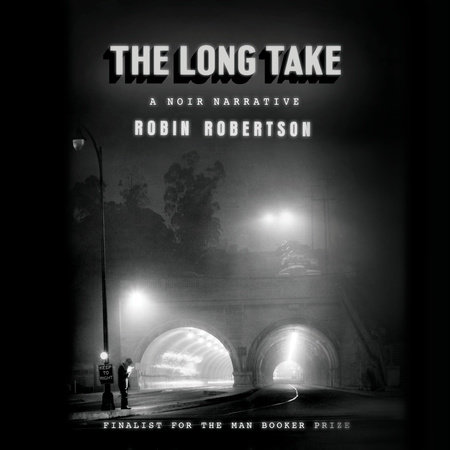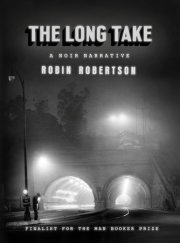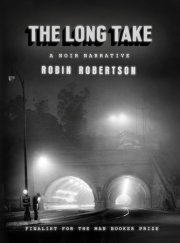from Part II: 1948 The heat was gone. They could feel it.
There was a hectic joy downtown, a release. King Eddy’s
six-deep at the bar and still coming.
‘Okay, guys. Best killing in the movies.’
‘Tommy Udo! It’s gotta be Tommy Udo!’
‘That’s up there, sure, but how about
Raw Deal when the broad gets the flambé in the face?’
‘Didn’t kill her, though.’
‘What about
T-Men,
when The Schemer gets cooked in the steam-room?’
‘Nice . . .’
‘That other film of his, the Western, what’s it called?
Border Incident! That’s got a death by
tractor.’
‘Or
Union Station, half a mile away – death by cattle stampede!’
‘I like that shoot-out in the hall of mirrors . . . ’
‘Nah, too classy. I’d vote for
Decoy – Jean Gillie
crushing her boyfriend with her car.’
‘Yeah, or that chesty dame with the ice-pick, Janis Carter.’
‘He survived . . .’
‘I’d take Raymond Burr in
Desperate. Great movie.
The way he goes over the stair-rail at the end
and drops four flights. That’s a lulu.’
‘Well, if you’re talking stairs it’s
gotta be Tommy Udo,
c’mon . . .’
‘Yeah: hard to beat that – tying an old lady to her wheelchair
then pushing her down a flight of stairs.
Widmark’s first film, and he was
dynamite.’
‘Okay. All agreed? Right.
Kiss of Death. Udo gets the cake.’
*
He remembered the German on the barricade who took a magnesium flare in the chest and went up like a bonfire: so white you couldn’t look, but you couldn’t quite look away. *
He dreamt the mountains were on fire
and the flames were gliding down the sides like lava,
the mountains were slipping into the sea which was on fire,
into the city, which was also burning,
and the ground opened up then
and he dreamt that he walked away,
streets full of stones,
and he saw a black man black with flame, black leaves
falling all around him: a black autumn, coming down.
And Pike, he dreamt of Pike,
pinning him by the throat to the ground, with a knife.
And then he woke.
*
There was a new crack through the tiles in the bathroom,
running in a straight line from the window to the door.
*
He was working nights at the
Press, nights out on the street,
sharpening now after the turn in the year, the air
loosened after the rain, the pavement black and glinting.
There were parts of the city that were pure blocks of darkness,
where light would slip in like a blade to nick it, carve it open:
a thin stiletto, then a spill of white; the diagonal gash
of a shadow, shearing; the jagged angle sliding over itself
to close; the flick-knife of a watchman’s torch, the long gasp
of headlights from nowhere, their yawning light – then
just as quickly
their falling away:
closed over, swallowed
by the oiled, engraining, leaden dark.
He hears someone running
but there’s no one there.
His shadow folds into the wall, then along it.
Then gone.
*
‘Hey, Walker. Wanted in Overholt’s office.’
He went through, past the juniors: Pike, talking over
the top of everyone, repeating his punch-line
louder each time, harder.
The old man was checking finals, but he pushed them aside.
‘Very well, Walker, you can go this summer. Up to San Francisco.
I like what you’ve done here on this homeless issue,
so we’ll use you as a stringer, see how it goes.
I want a big piece on this, on the whole thing.’
‘You mean the destitute?’
‘Yes. Out on the streets
while the mayor and the police commissioner
are fine-dining in Chasen’s or Musso’s Back Room.
I mean the fact that two thirds of this city
is a fenced-off ghetto;
that there’s graft and corruption running right the way through.
I mean the fact that this is a country where there aren’t enough homes,
enough jobs, where one in six Angelenos are ex-servicemen
and they’re lying out on Skid Row –
but all anyone ever talks about is watching for Russians,
HUAC locking up half of Hollywood,
the government building more bombs.
We won the war, but we’re living like we lost it.’
He stood, and went to the window.
‘Things are hotting up, Walker. It’s a good time to go.’
Copyright © 2018 by Robin Robertson. All rights reserved. No part of this excerpt may be reproduced or reprinted without permission in writing from the publisher.






